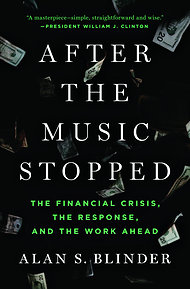Alan S. Blinder describes his new book, “After the Music Stopped,” as a “second draft” of the history of the financial crisis and the government’s response. He argues that many Americans still do not understand what went wrong, and he contends that the government still does not get enough credit for the successes of its policies.
Book Chat
Talking with authors about their work.
 Denise Applewhite/Princeton University Alan S. Blinder, a Princeton economist and author of “After the Music Stopped.”
Denise Applewhite/Princeton University Alan S. Blinder, a Princeton economist and author of “After the Music Stopped.”
Prof. Blinder, a Princeton University economist and former vice chairman of the Federal Reserve, judges that the government itself is at fault. He writes in the book, “The two secretaries of the Treasury during the crisis period, Henry Paulson and Timothy Geithner, have between them barely given a single coherent speech explaining what happened and – perhaps more important – why they did what they did.”
And he is concerned that the resulting combination of public ignorance and outrage will impede the government’s response the next time that a bubble pops.
The first part of the book, the account of the crisis, is lucid and entertaining. There will never be complete agreement about the causes of the crisis, not least because the stories we tell about the past are shaped by the things we want from the future. But four years later, we have reached the point where those stories can be well told.
The second part, a qualified defense of the Obama administration, reads more like a first draft of history, and it is likely to prove more controversial. The events are more recent, the recovery is still a work in progress, and we won’t know how well the government has prepared to deal with the next crisis until we get there.
The following is a condensed transcript of our recent e-mail exchange:
You write, “Our best hope is to minimize the consequences when bubbles go splat — and they inevitably will.” How much confidence do you have that when the next bubble goes splat, we will be ready, willing and able to contain the damage?
Less than I wish I had. But I’m at least hopeful that some of the lessons we’ve learned, and some of the actions we’ve taken, will make the next bubble less damaging than the last ones. For example, we now understand better the dangers that lurk in high leverage, overly complex financial instruments, and lax (or nonexistent) regulation.
While you conclude that government policies were successful in arresting the crisis, you argue that the government should have imposed stronger conditions on banks that received aid, and that it should have acted more forcefully to help people facing foreclosure. Have those failures slowed the economic recovery?
Yes. For example, until very recently, one major factor behind the sluggish recovery was the failure of home building to rebound. And one major reason for that was the seemingly unending waves of foreclosures. How can a builder compete with foreclosed properties coming on the market at 50 percent of construction cost? A second significant headwind is the meager snap-back in bank lending. If the government had made more lending a condition of receiving aid, that would not have changed a D performance into an A. But it might have gotten us a C+ or a B-.
I was surprised by the weight you place on a third failure: poor communication. Do you believe that the policies would have been more effective if the public better understood what the government was trying to do, or just that the administration would have been able to do more if it had retained public support?
It’s more the latter: not being able to do more. But I also believe — as a small-d democrat — that the public is entitled to better explanations when they are being used as guinea pigs in a massive socioeconomic experiment. That said, my greater fear is that rampant misunderstanding of what was done in 2008-9 will make it harder for us, politically, to cope with the next crisis.
 Penguin Group (USA)
Penguin Group (USA)
Of all the choices made by policy makers during the crisis, you express the greatest anger over Secretary Paulson’s three-page TARP bill, which sought to exempt the program from pretty much any oversight or accountability. You variously describe it as an “outrage” and “an assault on the Constitution.”
Well, first of all, let’s note that the mistake was rectified quickly, in large part because of the torrent of criticism that followed. So the actual damage was limited. But the original three-pager certainly didn’t instill confidence in the Paulson Treasury — at a crucial time. I was particularly angry because it showed such disrespect for the Constitution, e.g., by banning judicial review. At the height of the crisis, we needed a dose of “big government” to save us from economic ruin. The first TARP proposal gave big government a bad name.
You credit the Fed for its efforts to stabilize financial markets. But you also write that the bubble in bond prices “does start with the Federal Reserve’s monetary policy.” How much blame, then, does the Fed deserve for starting the fire it later extinguished?
The “error” of holding interest rates too low for too long was only obvious after the fact, not before. In fact, the Fed had good reasons to hold interest rates very low in the early 2000s: The recovery was pathetic, and we faced a real risk of deflation. And those who place primary blame for the house-price bubble on the Federal Reserve are exaggerating so much that it smacks of a put-on. When home buyers believe that house prices will keep on rising at 10 to 15 percent a year, would, say, a half-percentage-point increase in the mortgage interest rate stop speculation?
The book ends with a new version of the Ten Commandments. The second is, “Thou shalt not rely on self-regulation.” You describe the very term as “an oxymoron, maybe even a cruel deception.” Yet your third, fourth, fifth, sixth and ninth commandments call on financial companies to do a better job of self-regulation. The ninth, for example, says compensation should be aligned with risk. You write, “This commandment ought to be enforced by C.E.O.’s and corporate boards; but if they won’t do the job, we may need the heavy hand of government.” Some people would say we’ve let that experiment run long enough. Why prioritize improved corporate conduct?
In truth, we need both. I say repeatedly in the book that foxes don’t make good chicken-coop guards. We need far better government regulation and supervision than we had before the crisis. But supervisors cannot be everywhere. In the regulatory game of cat-and-mouse, the mice will sometimes (often?) fool the cats. This is particularly true, I think, in the area of executive compensation. We need — or perhaps I should say, we should hope for — better management and more alert boards of directors.
Article source: http://economix.blogs.nytimes.com/2013/01/24/alan-blinder-on-the-lessons-of-the-financial-crisis/?partner=rss&emc=rss